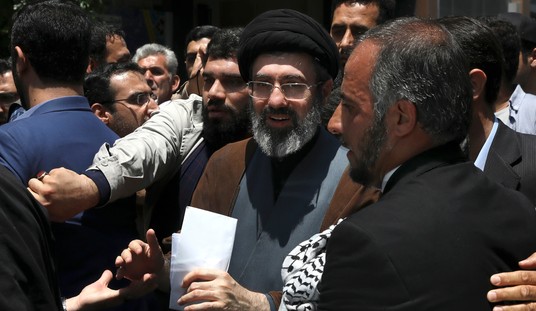He’s trying to make a point here about the superficial way in which the media tests candidates for foreign-policy aptitude. What’s more important? That Johnson would have a brain fart when asked to name a foreign leader he admires? Or that Hillary Clinton supported American interventions in Iraq and Libya despite the White House lacking a plan to stabilize either country afterward? Only one of those problems is likely to result in Americans dying, and it ain’t the one Johnson has.
But there are ways to make that point more and less skillfully. This would fall under the category of “less skillful.”
“You know, when it comes to talking about a foreign leader that you admire, I have a hard time with that one,” Johnson told Mitchell on Tuesday. “That’s politics. That’s just who I am … maybe I think too much.”
Mitchell responded that Johnson was running to be commander-in-chief and that knowing how to answer such questions was “part of the portfolio.”
Johnson replied that “the fact that somebody can dot the I’s and cross the T’s on a foreign leader or geographic location then allows them to put our military in harm’s way.”
What he means to say, I guess, is that growing too interested in events in other countries creates a temptation to influence those events, but he ends up suggesting that rudimentary knowledge of foreign affairs on the order of “Name a foreign leader whom you like” is some sort of dangerous hindrance to judicious isolationism. A reply like that should be especially grating to libertarians since it reduces their principled opposition to interventionism to a caricature of willful blindness. Most libertarians would say, I assume, that it’s because they pay more attention to foreign affairs and America’s track record in adventures abroad than the average person that they’re sensitive to the risks of intervening. Johnson could have made that argument, the argument from a position of knowledge, by dotting a few I’s and crossing a few T’s himself about world events to demonstrate basic knowledge. That he wouldn’t do so even after he’s developed a reputation for ignorance, fairly or not, is strange.
Incidentally, he had an easy answer available to him the first time he was asked to name a foreign leader he admires. Namely, there are no libertarian foreign leaders. The world’s in the straits that it is, he could have said, because global regimes are dominated by belligerent authoritarians like Trump or bumbling humanitarian adventurists like Clinton, forever screwing regions up yin-yang-style. The entire planet needs to try something different and Johnson is something different for America. He could have also said that there are no current foreign leaders he admires particularly but that he’s always admired Vaclav Havel for how he helped rebuild the Czech Republic as a more open society after the iron curtain fell. The “name a foreign leader” question is, to some degree, a test of political dexterity, to see how deftly he can steer it around to advancing his own agenda. He did a better job of that below than he did the first time it was asked of him a few days ago, but still — not great. Oh well. Little to lose at this point, no?








Join the conversation as a VIP Member